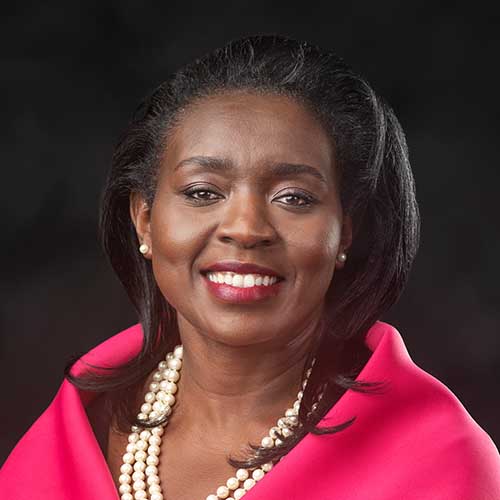The information presented on this page may be dated. It may refer to situations which have changed or people who are no longer affiliated with the university. It is archived as part of Mississippi State University's history.
On a recent drive down Main Street Starkville, Dr. Caroline Kobia, assistant professor in the School of Human Sciences, noticed a shocking number of businesses closed. This once lively street full of small businesses was now littered with boarded windows and 'for sale' signs. Originally from Kenya, Kobia now proudly calls Mississippi home and was alarmed at the decline in entrepreneurship in the growing town of Starkville, particularly in retail businesses. With 142,040 people employed by Mississippi's retail industry, Kobia recognized the severity of these failing fashion businesses. Her concerns propelled her to launch research efforts aimed at empowering small businesses in rural areas.
"Recently there's a lot of disruptions going on in the retail industry. This made the research, which has been in the works for a long time, even more urgent," said Kobia, a MAFES fashion design and merchandising scientist. "What makes a city or a main street attractive are the small and locally-owned businesses located there. We needed to reach out and see what is it that we could do to help these small businesses perform better."
Kobia and her colleague, Dr. Charles Freeman, associate professor in the School of Human Sciences, began their work by identifying fourteen Mississippi small businesses specializing in fashion with potential room for growth. Although referred to as 'small' businesses, their impact is big. The fashion retail industry in Mississippi brought in over $456 million in 2021. These businesses were selected to be the subjects of a multi-institutional research project. The team, partnering with Louisiana State University, interviewed the small business owners and assessed both strengths and weaknesses in their business models. Through understanding the potential problem areas in these businesses, Kobia and Freeman were able to educate owners along with connecting them to existing management resources to help their companies thrive.
To truly identify these problems and connect businesses to the necessary resources, Kobia and Freeman first had to discover the cause of these entrepreneurial issues. Through their research, they found that problems such as the neglecting of technology incorporation and a lack of specialized employees stems from the statewide issue of "brain drain." The term brain drain refers to the migration of educated and specialized workers from Mississippi because of their inability to find work in their home state. This is a particular interest of Freeman's as he serves on the MSU Center for Entrepreneurship and Outreach's advisory board and assisted in the launch of the MSU Idea Shop, a center dedicated to empowering students to launch new ideas and companies. Both organizations serve as vital resources for entrepreneurs in Mississippi.
"I think Mississippi's a great microcosm of what's going on in a broader scope," Freeman said. "The challenges here of cultivating a feeling of entrepreneurship and supporting small businesses also exist in other rural areas. If we can have some solutions and best practices that solve the problem here, we can apply those practices nationally."
Through the MSU Center for Entrepreneurship and Outreach, resources such as the startup mentorship program, professional service partners, and funding opportunities are available to uplift these small businesses. Kobia and Freeman, along with Louisiana State University collaborators Dr. Chuanlan Liu, professor of merchandising, and Dr. Chunmin Lang, assistant professor of merchandising, conducted research and summarized their findings. The research entitled, "Cultivating Rural Entrepreneurship for Community and Economic Vitality: A Case Study of Small Fashion Business in MS," was recognized by the American Collegiate Retailers Association as the Best Track Paper in Local and Global Retailing and Entrepreneurship and overall Best Paper Award for 2022 by the International Journal of Retail and Distribution Management. In the next phase of their research, the team will continue to help businesses implement the skills and resources they were taught.
"Working with these businesses is impactful. If we can help even one business, we have made an impact in the community," Kobia said. "It's a domino effect as that business hires employees and gives back to the community. This puts a smile on my face as we see these lives being changed."
This research is funded by the Mississippi Agricultural and Forestry Experiment Station.
The challenges here of cultivating a feeling of entrepreneurship and supporting small businesses also exist in other rural areas. If we can have some solutions and best practices that solve the problem here, we can apply those practices nationally.
Charles Freeman
Behind the Science

Caroline Kobia
Associate Professor
Education: B.Ed., Home Economics and Technology, Moi University, Eldorat, Kenya; M.S., Ph.D., Textiles, Apparel Design and Merchandising, Louisiana State University
Years At MSU: 9
Focus: Consumer behavior, experiential learning, and entrepreneurship
Passion At Work: I am passionate about connecting students with employers in the retail industry and empowering communities.

Charles Freeman
Associate Professor
Education: B.S., M.S., Textiles and Consumer Sciences, Florida State University; Ph.D., Human Ecology, Louisiana State University
Years At MSU: 10
Focus: Product development and design from conceptualization to consumer
Passion At Work: I am passionate about creating new product/market opportunities for agricultural products in fashion and textiles as well as seeing innovative ways fashion and textiles can improve agriculture.


